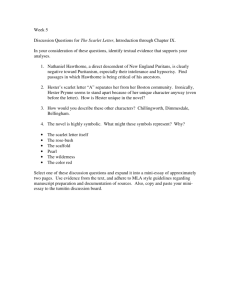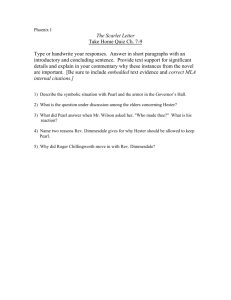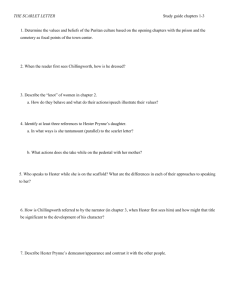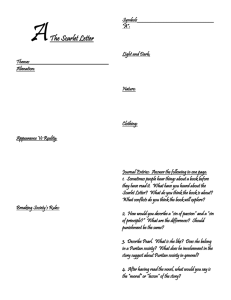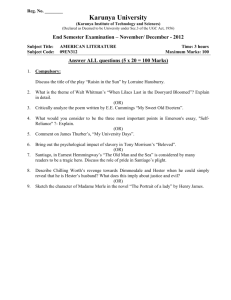The Recognition p. 56-64 Introduction of a stranger
advertisement
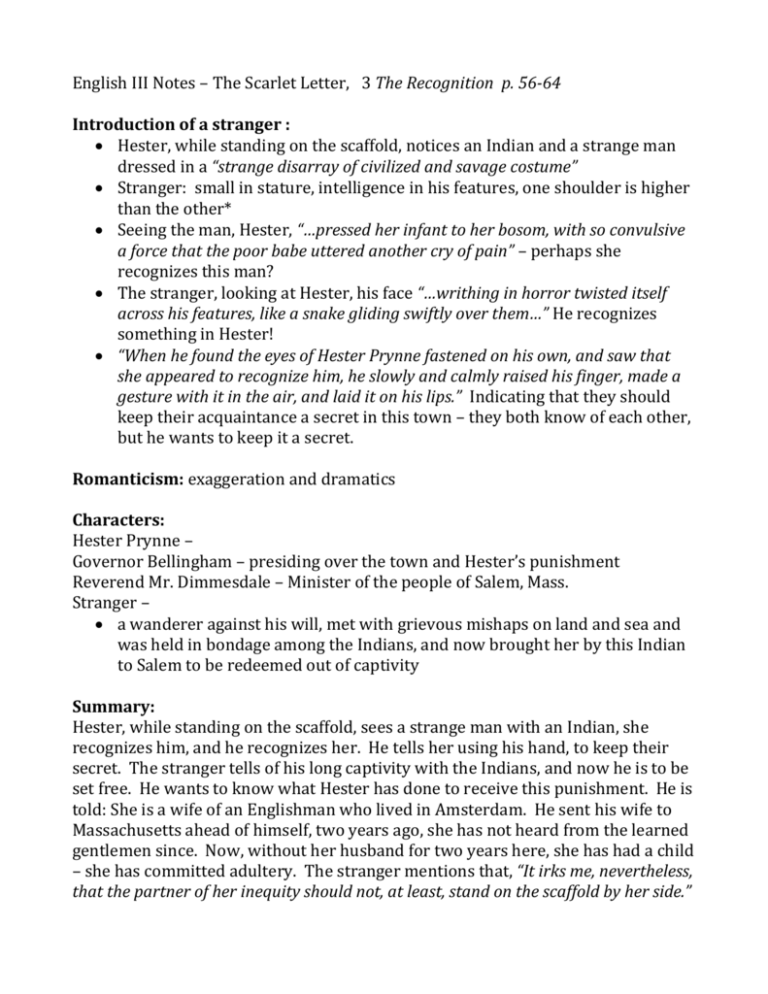
English III Notes – The Scarlet Letter, 3 The Recognition p. 56-64 Introduction of a stranger : Hester, while standing on the scaffold, notices an Indian and a strange man dressed in a “strange disarray of civilized and savage costume” Stranger: small in stature, intelligence in his features, one shoulder is higher than the other* Seeing the man, Hester, “…pressed her infant to her bosom, with so convulsive a force that the poor babe uttered another cry of pain” – perhaps she recognizes this man? The stranger, looking at Hester, his face “…writhing in horror twisted itself across his features, like a snake gliding swiftly over them…” He recognizes something in Hester! “When he found the eyes of Hester Prynne fastened on his own, and saw that she appeared to recognize him, he slowly and calmly raised his finger, made a gesture with it in the air, and laid it on his lips.” Indicating that they should keep their acquaintance a secret in this town – they both know of each other, but he wants to keep it a secret. Romanticism: exaggeration and dramatics Characters: Hester Prynne – Governor Bellingham – presiding over the town and Hester’s punishment Reverend Mr. Dimmesdale – Minister of the people of Salem, Mass. Stranger – a wanderer against his will, met with grievous mishaps on land and sea and was held in bondage among the Indians, and now brought her by this Indian to Salem to be redeemed out of captivity Summary: Hester, while standing on the scaffold, sees a strange man with an Indian, she recognizes him, and he recognizes her. He tells her using his hand, to keep their secret. The stranger tells of his long captivity with the Indians, and now he is to be set free. He wants to know what Hester has done to receive this punishment. He is told: She is a wife of an Englishman who lived in Amsterdam. He sent his wife to Massachusetts ahead of himself, two years ago, she has not heard from the learned gentlemen since. Now, without her husband for two years here, she has had a child – she has committed adultery. The stranger mentions that, “It irks me, nevertheless, that the partner of her inequity should not, at least, stand on the scaffold by her side.” No one knows who the father of the baby is, because Hester refuses to tell his name, she is protecting someone. The town has not put the full force of the law into effect, because no one knows the fate of her missing husband, he may be dead, they decided to go easy on her, and not punish her with death. She only has to stand 3 hours on the scaffold today, and then forever wear the shame of the Scarlet Letter upon her bosom. John Wilson, an elderly clergyman from Boston, wants the Minister of Salem, Reverend Dimmesdale, to ferret out the name of the baby’s father from Hester, because her soul is in his hands, but the young Rev. Dimmesdale does not want to do this. Finally, Rev. Dimmesdale speaks to Hester, “…I charge thee to speak out the name of thy fellow-sinner and fellow-sufferer!” Strange that he should add this. (?) Rev. Dimmesdale also says, “…believe me, Hester, though he were to step down from a high place, and stand there beside thee, on thy pedestal of shame, yet better were it so, than to hide a guilty heart through life”…”thy silence do for him, except it tempt him – yea, compel him, as it were – to add hypocrisy (falseness, deceit, dishonesty, fraud) to sin?” The towns people think she has to give up the name, or surely the father will step forward now to acknowledge his sin, but she shakes her head no and no one steps forward. Dimmesdale, murmers: “Wondrous strength and generosity of a woman’s heart! She will not speak!” He is actually praising her restraint to name the father, he is praising her loyalty to this man. When her time is up, she is lead back into the prison. Romanticism example = “It was whispered, by those who peered after her, that the scarlet letter threw a lurid gleam along the dark passage-way of the interior.” Last sentence in this chapter.
